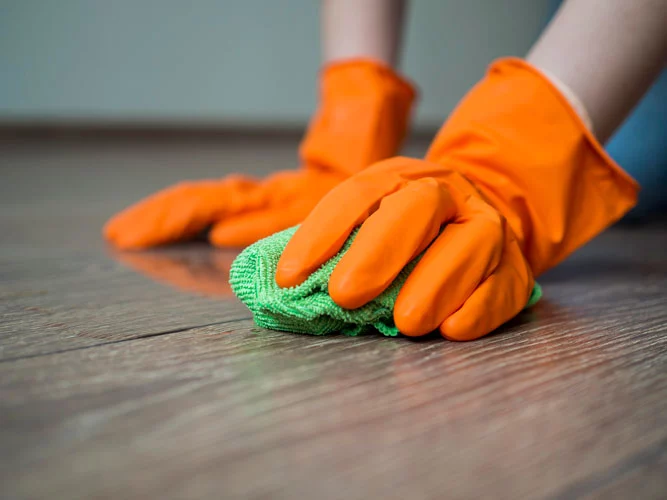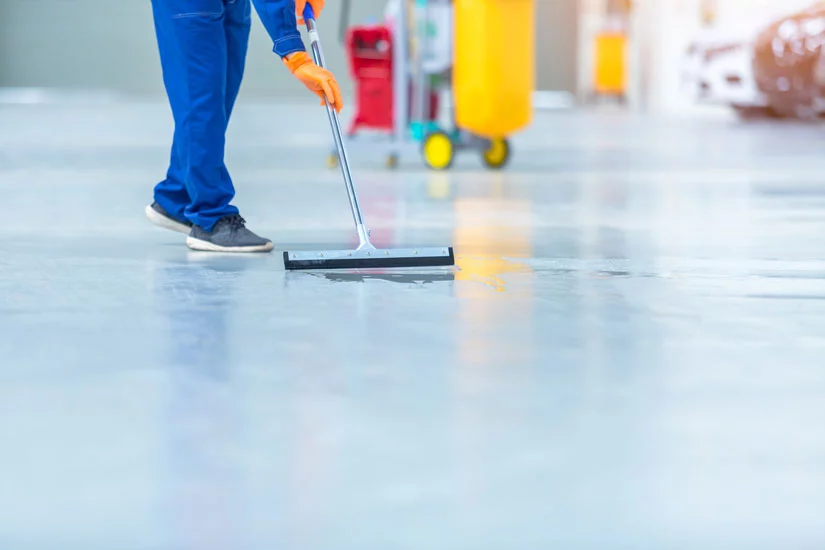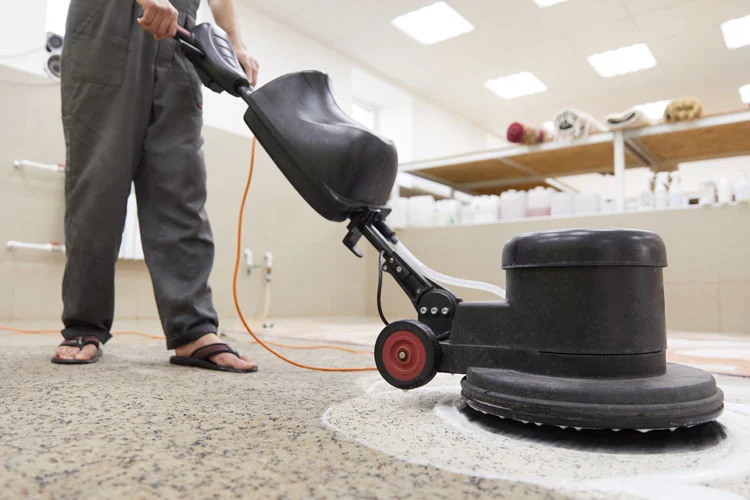Almost all surfaces would be exposed to corrosives at some point in their lifetime. Most of these (like cleaning products) are pretty harmless, and your paint withstands without giving out. However, in an industrial environment, it is not so. They are exposed to chemicals, acids, alkalis, salts, and others that are harsh for most surfaces.
That is why you need to protect them with a coating that would resist the chemical without breaking. This type of paint would also resist any acid and alkali that is a part of the regular cleaning process and maintenance.
This article takes you through various chemical-resistant floor paint, maintenance, and more.
What is Chemical-Resistant Paint?
Chemical-resistant paint provides superior protection from harsh substances. It has been designed to shield the floor from chemicals. It is a type of alkyd paint that is thicker and harder when it dries. Moreover, it retains its good looks for a long time despite being in contact with corrosives.
You can apply it to any surface that needs protection from chemical spills. For example, floors, walls, doors/windows, utilities, ceilings, and more. Besides, it works on any substrate, including wood, metal, ceramic, concrete, and masonry
Chemical-resistant paint is available in various forms:
- Epoxy
- Polyurethane
- Phenolic
- Fluoropolymers such as Xylan and Teflon
Epoxy Coating/Sealer
Epoxy is a type of polyamide paint that provides an acid- and chemical-resistant coating for any surface when applied. An epoxy floor is available in two types: one-component, two-component, powder, and others.
One-component epoxy is used in new constructions as a base. The two-component epoxy goes over it, giving it color. It also protects against chemical substances.
Polyurethane
Polyurethane is a type of synthetic resin that can be applied as a paint or floor coating. It provides durability and chemical resistance, making it the best choice for various surfaces. In addition, polyurethane serves as an excellent medium for applying pigments, primers, and sealing materials. Sought for its colorful appearance, it is often used in homes and commercial spaces.
Phenolic Coating/Sealer
A phenolic coating is a type of two-component resin that is applied either air or flash-dry. It provides excellent chemical resistance to surfaces like wood, metal, plastic, and masonry.
Fluoropolymers (Xylan)
Xylan is a fluoropolymer with Teflon consisting of thermoplastic resins. When dried, it slips easily on surfaces. It also provides excellent adhesion along with chemical resistance floor paint.
Is Epoxy Floor Chemical Resistant?
Epoxy coating provides superior chemical resistance against most corrosives. Industries often use it for painting concrete floors and walls. It is ideal for use in high-exposure areas. For example, secondary containment, trenches, pump pads, and solvent storage.
It is also ideal for applying on other surfaces such as metal and PVC. The advantage of using chemical-resistant epoxy is that it is cheaper than paint. This is because you would have to apply multiple layers in an industrial environment. Ensure that you read the application instructions. The application process varies depending on the product.
Is Silicone Caulk Chemical Resistant?
Yes, silicone caulk is chemical resistant. Industries use it for sealing pipes and fittings where chemicals are used at high concentrations. For example, laboratories, hospitals, wastewater treatment plants, and pharmaceutical companies. It works well with compounds such as hydrocarbons, oils, greases, organic solutions.
What is Acid-Resistant Paint?
Acid-resistant paints can prevent corrosion caused by acids, alkalis, salts, and bacteria. They are also water-resistant. These paints generally include polyurethanes, alkyd resins, epoxy resins, acrylic resins, and vinyl. They can withstand a wide variety of acids such as sulfuric acid, nitric acid, hydrochloric acid, phosphoric acid, and more.
Which Paint Coat Gives Extreme Chemical-Resistance?
According to experts, polyurethane is the most chemical-resistant floor paint available on the market. This is because they can resist acid, salt, mildew, fungi, bacteria, alkali, and other harmful chemicals. As a result, polyurethane paint is ideal for use in chemical facilities. For example, food processing areas, labs, hospitals, and pharmaceutical companies.
Chemical Resistant Epoxy Coating Vs. Paint
Epoxy paint and coating both resist corrosives to some extent. However, they are not the same and have some noticeable differences. Here are a few points you may have to consider if you choose it for your industry floor.
- Epoxy coatings are thicker than epoxy paints.
- Paints may not be as chemically resistant as an epoxy coating.
- Epoxy coating is quite tricky to apply.
- Coatings generally have a longer working life than paints.
- Epoxy coating is more resistant to damage from abrasion or impact. However, if exposed to sunlight, it chalks and abrades faster.
How do You Protect Concrete Floors from Acid?
An epoxy coating protects concrete floors from acid and other corrosives. It is famous for its excellent chemical resistance. Not only does it offer protection against acids, but it also prevents damage caused by salt, alkalis, and other common corrosives.
Chemical Resistant Concrete Coating
Concrete coating is a protective layer applied to concrete surfaces. Generally, it is more resistant than paint. There are several types of coatings, including epoxy, polyurethane, and other hydrophobic solutions. While some are chemical resistant, others only resist water and some organic liquids.
Industries use a chemical-resistant concrete coating to protect surfaces from corrosive substances. They are a good solution for areas with high exposures to acids or alkalies.
Conclusion
There are many different types of paints and coatings available for industrial use. Some of them are more chemical resistant than others. If you want a chemical-resistant floor paint or coating, look for epoxy or concrete coatings.
Epoxy paint protects against chemicals, fuels, oils, solvents, water, and alkalis. It also provides longer service life than other types of paints. Epoxy paints are available in many colors, so you can choose the one that best suits your needs. Make sure it is resistant to the chemicals you need protection from.
If you are looking for epoxy paint of any type, there are many suppliers to choose from. Look for a company that has been around a long time. It should also have a reputation for selling quality products.
Here at Wiese Painting, we have over 65 years of experience as professional industrial and commercial painters. We guarantee that any hard-to-paint color or surface, like concrete, is tackled with professionalism and tricks that have been acquired over the decades. You will love the look of your freshly-painted home or business, so contact us today for your free quote!













